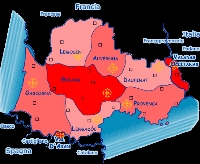Occitania

At first sight, this territory may appear very heterogeneous with regard to its natural environment, costumes, traditions, nationality. Yet, many common elements may be found. First of all, the language, comprehensible by all Occitan-speaking people, from the Alps to the Pyrenees. Then, Occitan music, that, thanks to its universal language, crosses political and physical borders, with a repertoire dating back to the medieval tradition of troubadours. Together with music comes Occitan dance, representing a vast and lively heritage performed successfully also outside the Occitan territory.
Occitania is associated with the symbol of the Toulouse cross, appearing on the flags waving outside the Occitan town halls or on t-shirts, pendants and other gadgets. That cross is also found carved on ancient monuments in a geographic area larger than the mere linguistic Occitan area.
Within this vast territory, the Occitan valleys of Piedmont have been accessible with great difficulty for much of human history and have for this reason preserved the language, the traditions and, in the Waldensian valleys, the existence of one of the most enlightened medieval religious movements. The valleys have suffered a strong population decline due to emigration since the end of World War II, but at present they rely on Occitan culture, tourism, traditional agricultural and farming activities to implement a sustainable model of development.
Visiting the Occitan valleys is a way to contribute to keeping alive the Occitan culture which is revealed in the warmth of its inhabitants, in the traditional local food and craftworks, in a vast hiking and climbing itineraries in a natural environment of extraordinary beauty.
commenta